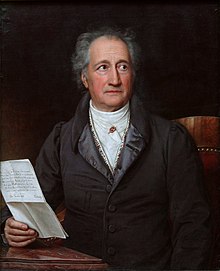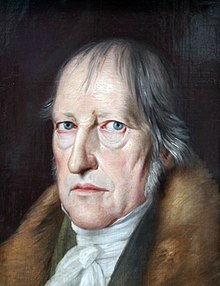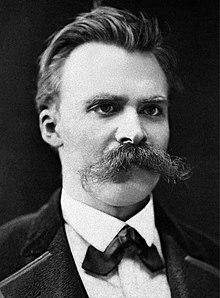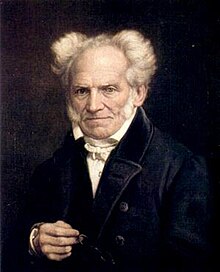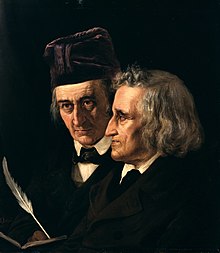
19th-century German male writers
The concept of Germany as a distinct region in Central Europe can be traced to Julius Caesar, who referred to the unconquered area east of the Rhine as Germania, thus distinguishing it from Gaul (France). The victory of the Germanic tribes in the Battle of the Teutoburg Forest (AD 9) prevented annexation by the Roman Empire, although the Roman provinces of Germania Superior and Germania Inferior were established along the Rhine.
9 episodes
Episodes in this category also belong to the following categories:
Clausewitz and On War
Melvyn Bragg and his guests discuss On War, the 19th-century treatise on the theory of warfare by the Prussian soldier Carl von Clausewitz.
17 May 2012
Featuring: Saul David, Hew Strachan, Beatrice Heuser
Goethe
Melvyn Bragg discusses the great German polymath Johann Wolfgang Goethe - novelist, dramatist, poet, humanist, scientist and philosopher.
6 April 2006
Featuring: Tim Blanning, Sarah Colvin, W. Daniel Wilson
Philosophers of linguisticsGerman philosophers of artRomantic poetsGerman philosophers of scienceGerman political philosophersJohann Wolfgang von Goethe, Sturm und Drang18th-century German civil servants, 18th-century German dramatists and playwrights, 18th-century German historians, 18th-century German novelists, 18th-century German poets, 18th-century travel writers, 19th-century German civil servants, 19th-century German diplomats, 19th-century German dramatists and playwrights, 19th-century German poets, German bibliophiles, German diplomats, German male novelists, People from Weimar, Scientists from Weimar, Writers from Frankfurt, Writers from WeimarLiteracy and society theoristsPhilosophers of social science19th-century German philosophersTheorists on Western civilizationGerman travel writersPhilosophers of literaturePhilosophers of sexualityEpic poets19th-century German novelistsPhilosophy writersLeipzig University alumni18th-century German male writersEpigrammatists18th-century German philosophers, 18th-century essayists19th-century travel writers19th-century German male writersUniversity of Strasbourg alumniGerman philosophers of languageMembers of the Göttingen Academy of Sciences and HumanitiesLiterary theoristsMembers of the Bavarian Academy of SciencesFabulistsGerman untitled nobilityGerman philosophers of culture19th-century German essayistsGerman male essayists18th-century German educators, 18th-century historians, 19th-century German educators, 19th-century historiansGerman autobiographersGerman ethicists, German philosophers of educationNatural philosophersGerman male dramatists and playwrights, German male poetsPantheistsFreethought writersEnlightenment philosophersGerman librariansWriters about activism and social changeColor scientistsGerman Freemasons19th-century German historians19th-century German non-fiction writersGerman philosophers of historyGerman male non-fiction writersGoethe and the Science of the Enlightenment
Melvyn Bragg assesses the scientific legacy of the 18th century German poet and thinker Goethe, who gave us the term morphology and is sometimes even credited with inventing biology itself.
10 February 2000
Featuring: Nicholas Boyle, Simon Schaffer
SciencePhilosophers of linguisticsGerman philosophers of artRomantic poetsGerman philosophers of scienceGerman political philosophersJohann Wolfgang von Goethe, Sturm und Drang18th-century German civil servants, 18th-century German dramatists and playwrights, 18th-century German historians, 18th-century German novelists, 18th-century German poets, 18th-century travel writers, 19th-century German civil servants, 19th-century German diplomats, 19th-century German dramatists and playwrights, 19th-century German poets, German bibliophiles, German diplomats, German male novelists, People from Weimar, Scientists from Weimar, Writers from Frankfurt, Writers from WeimarLiteracy and society theoristsPhilosophers of social science19th-century German philosophersTheorists on Western civilizationGerman travel writersPhilosophers of literaturePhilosophers of sexualityEpic poets19th-century German novelistsPhilosophy writersLeipzig University alumni18th-century German male writersEpigrammatists18th-century German philosophers, 18th-century essayists19th-century travel writers19th-century German male writersUniversity of Strasbourg alumniGerman philosophers of languageMembers of the Göttingen Academy of Sciences and HumanitiesLiterary theoristsMembers of the Bavarian Academy of SciencesFabulistsGerman untitled nobilityGerman philosophers of culture19th-century German essayistsGerman male essayists18th-century German educators, 18th-century historians, 19th-century German educators, 19th-century historiansGerman autobiographersGerman ethicists, German philosophers of educationNatural philosophersGerman male dramatists and playwrights, German male poetsPantheistsFreethought writersEnlightenment philosophersGerman librariansWriters about activism and social changeColor scientistsGerman Freemasons19th-century German historians19th-century German non-fiction writersGerman philosophers of historyGerman male non-fiction writersHegel's Philosophy of History
Melvyn Bragg and guests discuss Hegel's ideas on history as the progress of the consciousness of freedom, and whether we enjoy more freedom now than those in past centuries.
26 May 2022
Featuring: Sally Sedgwick, Robert Stern, Stephen Houlgate
PhilosophyGerman philosophers of artGerman political philosophersUniversity of Tübingen alumniGerman LutheransTheoretical historians19th-century German philosophers19th-century mysticsGerman idealistsPhilosophers of law18th-century German writersDeaths from choleraPhilosophy writers18th-century German male writersGerman philosophers of mind, German philosophers of religionWriters about religion and scienceAcademic staff of the Humboldt University of Berlin18th-century German philosophers, 18th-century essayists19th-century German male writersGerman philosophers of language19th-century German essayistsBurials at the Dorotheenstadt CemeteryGerman male essayists18th-century German educators, 18th-century historians, 19th-century German educators, 19th-century historiansMetaphysiciansHeidelberg University alumniPantheistsEnlightenment philosophersGerman philosophers of historyGerman male non-fiction writersKant's Copernican Revolution
Melvyn Bragg and guests discuss Kant's ideas on how the world depends on us, on the limits of human knowledge and why we are bound to ask questions we cannot answer.
3 June 2021
Featuring: Fiona Hughes, Anil Gomes, John Callanan
PhilosophyGerman philosophers of artNatural law ethicistsGerman philosophers of scienceGerman political philosophersMetaphilosophersPhilosophers of social sciencePhilosophers of warGerman Lutherans18th-century philosophersTheoretical historiansGerman nationalists19th-century German philosophersTheorists on Western civilizationPhilosophers of literatureGerman idealistsAge of EnlightenmentPhilosophers of logicLogiciansPhilosophers of lawPhilosophers of sexuality18th-century German writersPhilosophy writersRationalists18th-century German male writersKantianismGerman philosophers of mind, German philosophers of religionWriters about religion and science18th-century German philosophers, 18th-century essayists19th-century German male writers19th-century Prussian peopleHumor researchersGerman philosophers of culture19th-century German essayistsPeople of the Age of EnlightenmentGerman agnosticsGerman male essayistsOntologistsGerman ethicists, German philosophers of educationLecturersMembers of the Prussian Academy of SciencesIdealistsNatural philosophersEnlightenment philosophersGerman epistemologistsWriters about activism and social change19th-century German non-fiction writersGerman philosophers of historyGerman male non-fiction writersGerman logicians, Kantian philosophersNietzsche's Genealogy of Morality
Melvyn Bragg and guests discuss Nietzsche's influential ideas about what it means to be moral.
12 January 2017
Featuring: Stephen Mulhall, Fiona Hughes, Keith Ansell-Pearson
PhilosophyGerman philosophers of artDeaths from pneumonia in GermanyPhilosophers of nihilismMetaphilosophersExistentialistsPhilosophers of social science19th-century German philosophersTheorists on Western civilizationStateless peoplePhilosophers of literatureDeterministsPhilosophers of sexualityCritics of work and the work ethic19th-century German novelistsPhilosophy writersCritical theoristsLeipzig University alumniGerman philosophers of mind, German philosophers of religionWriters about religion and science19th-century German male writersAphoristsIrony theorists19th-century Prussian peopleUniversity of Bonn alumni19th-century German journalistsPhilosophers of psychologyGerman critics of ChristianityCritics of the Catholic Church19th-century German male musiciansAnti-consumeristsGerman philosophers of culturePhilosophers of timeCritics of religionsGerman male essayistsPeople associated with the University of BaselOntologistsMetaphysiciansGerman ethicists, German philosophers of educationAnti-nationalistsGerman epistemologistsPeople from the Province of SaxonyWriters about activism and social changeGerman military personnel of the Franco-Prussian War19th-century German non-fiction writersGerman philosophers of historyGerman male non-fiction writersGerman music criticsSchopenhauer
Melvyn Bragg and guests discuss the pessimistic philosophy of Arthur Schopenhauer and his extraordinary influence.
29 October 2009
Featuring: A. C. Grayling, Beatrice Han-Pile, Christopher Janaway
PhilosophyGerman philosophers of artGerman philosophers of scienceGerman political philosophers19th-century German writersMetaphilosophersGerman eugenicists19th-century German philosophersTheorists on Western civilizationSimple living advocatesPhilosophers of literatureGerman idealistsPhilosophers of logicLogiciansPhenomenologistsPhilosophy writersCritical theoristsGerman philosophers of mind, German philosophers of religionAcademic staff of the Humboldt University of Berlin19th-century German male writersAphoristsGerman philosophers of languagePhilosophers of psychologyUniversity of Göttingen alumniGerman critics of ChristianityGerman philologistsGerman philosophers of culture19th-century German essayists19th-century atheistsCritics of religionsAtheist philosophersGerman male essayistsCritics of JudaismOntologistsPhilosophers of loveGerman writers on atheismGerman ethicists, German philosophers of educationGerman monarchistsPhilosophers of pessimismGerman epistemologistsAnti-natalistsGerman philosophers of historyGerman male non-fiction writersGerman logicians, Kantian philosophersThe Brothers Grimm
Melvyn Bragg and guests discuss the fairy tales collected by the Brothers Grimm and what they can tell us about the German imagination and 19th-century romantic nationalism.
5 February 2009
Featuring: Juliette Wood, Marina Warner, Tony Phelan
Weber's The Protestant Ethic
Melvyn Bragg and his guests discuss Max Weber's book The Protestant Ethic and the Spirit of Capitalism.
27 March 2014
Featuring: Peter Ghosh, Sam Whimster, Linda Woodhead
HistoryHumboldt University of Berlin alumniDeaths from pneumonia in GermanyGerman philosophers of scienceGerman philosophers of technologyGerman political philosophers19th-century German writersGerman nationalists19th-century German philosophersContinental philosophersCritics of work and the work ethicGerman philosophers of historyPhilosophers of economicsAcademic staff of the Humboldt University of Berlin19th-century German male writersUniversity of Strasbourg alumniUniversity of Göttingen alumniGerman philosophers of cultureEconomic historians, German sociologists20th-century German philosophersMax WeberHeidelberg University alumniEconomic sociologistsPeople from the Province of SaxonyWriters about activism and social changeMembers of the Bavarian Academy of Sciences

